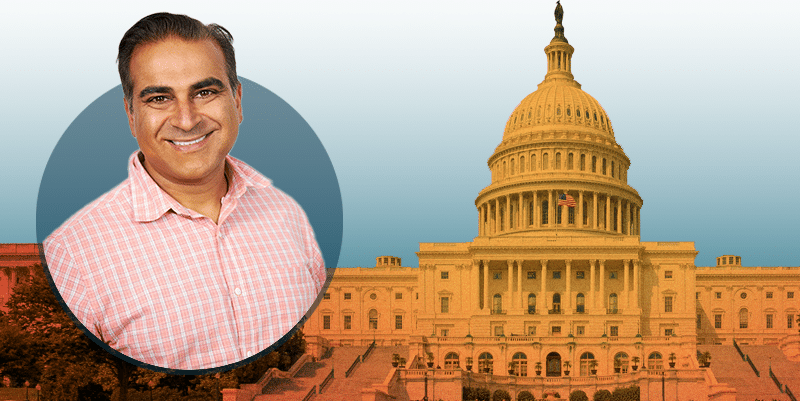May 23, 2024
On May 22, 2024 Ajay Amlani, President and Head of the Americas, testified as an expert witness during a US House Committee on Homeland Security Hearing. The hearing addressed “Advancing Innovation (AI): Harnessing Artificial Intelligence to Defend and Secure the Homeland.”
Read the Oral Testimony Presented at the Hearing
“Good morning, Chairman Greene, Ranking Member Thompson, and members of the Committee. My name is Ajay Amlani. I’ve been building innovative solutions to help organizations assure people’s identities for the last 20 years. Currently, I serve as the President, Head of Americas at iProov.
I started my federal service as a White House Fellow and Senior Policy Advisor to Secretary Tom Ridge, the first Secretary of Homeland Security, in the aftermath of the 9/11 Terrorist Attacks, at a time in which the federal government was rethinking how to manage its national security missions, and a large part of that included finding new ways to benefit from the innovation happening in the private sector.
For the past 20 years, I have forged partnerships between the federal government and the commercial sector that facilitate the utilization of commercial technology to augment national security initiatives.
Today, this Committee is considering how to harness the power of “AI” as part of a multi-layered defense against our adversaries. To best answer this question, we need to start with understanding how AI enables threat actors. What capabilities can DHS and its component agencies develop to combat these threats? What actions can the Department take to better work with industry as it promotes standards for AI adoption?
AI exponentially increases the capabilities and the speed to deploy new fraud and cyber attacks on the homeland. They enable threat technology developers to dramatically shorten their innovation cycles. Ultimately, AI technologies are unique in the way that they “up-skill” threat actors. The actors themselves no longer have to be sophisticated. AI is democratizing the threat landscape by providing any aspiring cybercriminal with easy-to-use, advanced tools capable of achieving sophisticated outcomes. The Crime-as-a-Service dark web is very affordable.
The only way to combat AI-based attacks is to harness the power of AI in our cybersecurity strategies. At iProov, we have developed AI-powered biometric solutions to answer a fundamental question: How can we be sure of someone’s identity? iProov is trusted by governments and financial institutions globally to combat cybercrime by verifying that an individual is not only the right person, but also a real person. Our technology is monitored and enhanced by an internal team of scientists specialized in computer vision, deep learning, and other AI-focused technologies. Novel attacks are identified, investigated, and triaged in real-time, and technology enhancements are continuous. This combination of human experts and AI technology is indispensable to harness AI in defending and securing the homeland.
But equally important is the need for AI-based security technologies to be inclusive and uphold privacy mandates by design. DHS and its component agencies have prioritized transparency and accountability, including performing routine self-assessments and collecting public input on matters of privacy protection and limitations on data use. I believe those actions serve as a great model for how DHS – and other agencies – should treat AI capabilities in this new wave of executive action for both regulating and promoting AI adoption.
The U.S. government has used biometrics in a growing number of programs over the past decade to improve operational efficiency and traveler experience. With Gen-AI, biometrics take on an expanded role of helping to ensure that someone is who they claim to be in digital ecosystems.
For example, deepfakes and synthetic identities have recently become so realistic that it is imperceivable to the human eye. Because of this, biometric verification must play a critical role in the nation’s security posture. I hope to have the opportunity to expand upon the topic during this hearing.
To best assist DHS and its components, Congress should support the creation of more useful standards for systems and testing; and give access to the best talent developing new technology tools with the agility necessary to respond to the changing threat environment.
The Silicon Valley Innovation Program (SVIP) is a very powerful model for both acquiring the expertise of the nation’s best engineering minds, while also creating a collaborative testbed for proving new technologies. iProov has worked with S&T in all phases of the SVIP program and can testify first-hand to the powerful impact that this program could have if expanded to scale with a broader group of stakeholders.
Another example, the Maryland Biometric Test Facility could be expanded upon to incorporate a wider range of perspectives as biometric technologies work to address future threats.
In conclusion, we at iProov are completely focused on pioneering capabilities which can counter identity fraud, while collaborating with federal stakeholders to advance innovation. We seek to play a constructive role in AI practices and hope the Committee will see us as a resource as you consider a path forward.”

Watch the Recording
A recording of the full committee hearing is available here.
About Ajay Amlani, President, Head of the Americas, iProov
Ajay Amlani is a respected and accomplished identity technology expert with deep cybersecurity knowledge across the private and government sectors. He drives the adoption of iProov’s face biometric technology as the premier way to authenticate consumers against the backdrop of growing cyberattacks and identity theft.
Amlani has been successfully growing identity technology companies since 2004. He was the co-founder of CLEAR and built the first identity platform for airport traveler implementations. Later he founded YOU Technology, which was acquired by Kroger in 2014, where he went on to launch their first mobile consumer experiences as Executive Vice President.
In 2003, The White House asked him to serve in the Department of Homeland Security where he led many of its first identity technology initiatives and international negotiations with the Group of Eight and the European Union. He helped start the Department of Defense’s Defense Innovation Unit.
